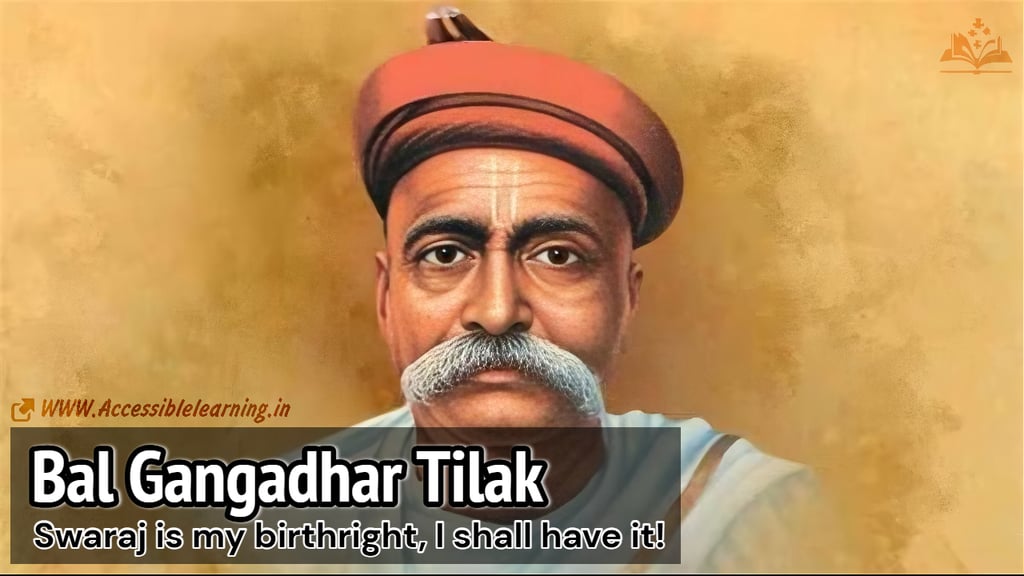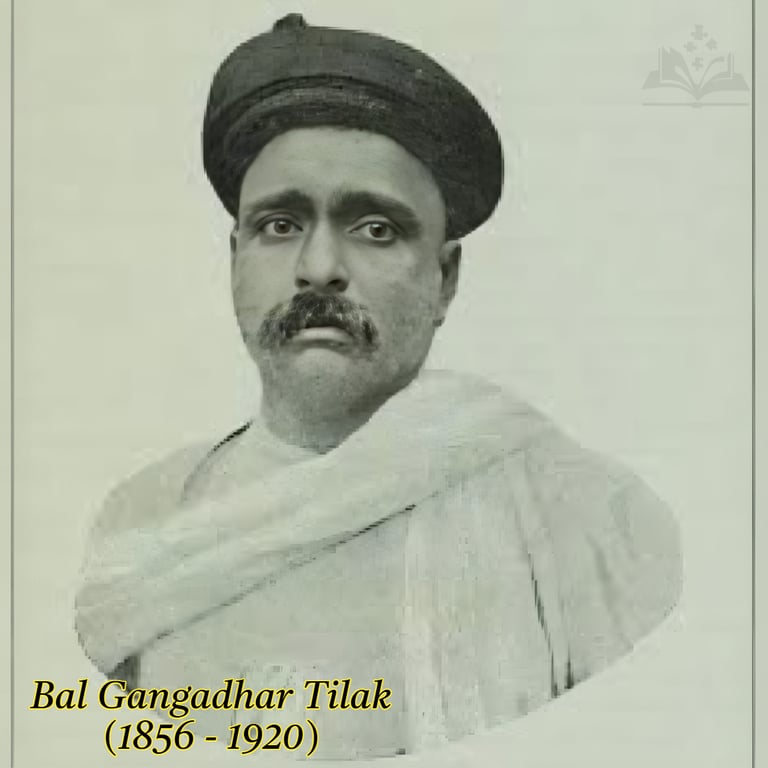
Swaraj is My Birthright: The Life and Legacy of Bal Gangadhar Tilak?
Bal Gangadhar Tilak Ji, often hailed as the "Father of Indian Nationalism," was a towering figure in India's struggle for independence. Known for his fiery speeches, intellectual depth, and unyielding spirit, Tilak championed the cause of Swaraj (self-rule) as a fundamental right for every Indian. From revitalizing India's cultural identity through Ganesh Chaturthi and Shivaji Jayanti to his revolutionary interpretations of the Bhagavad Gita, Tilak's contributions went far beyond politics. His relentless pursuit of justice, fearless resistance against colonial oppression, and enduring influence on India's freedom movement make him a timeless icon of courage and patriotism.
BIOGRAPHY/HISTORYINDIA/BHARATEMPIRES/HISTORYTHE GREAT LEADERBIOGRAPHY
Keshav Jha
12/18/20247 min read


Bal Gangadhar Tilak (बाल गंगाधर तिलक), hailed as the "Father of Indian Unrest," was one of the most influential leaders of the Indian independence movement. A fiery orator, fearless journalist, and astute reformer, Tilak's ideology and actions created ripples that reshaped the Indian struggle against British colonial rule. His legacy of Swaraj (self-rule) and resilience continues to inspire generations of Indians.
Early Life: Foundation of a Revolutionary?
Bal Gangadhar Tilak Ji (बाल गंगाधर तिलक) was born on July 23, 1856, in Chikhali, Ratnagiri, Maharashtra, into a conservative Chitpavan Brahmin family (चितपावन ब्राह्मण परिवार). Known as "Lokmanya/लोकमान्य" (accepted by the people as their leader), Tilak displayed a sharp intellect and independent spirit from a young age. He often challenged established norms, questioning British education policies and the social inequalities in Indian society.
After earning a bachelor’s degree in mathematics in 1877 and a law degree in 1879, Tilak chose to dedicate his life to social and political reform rather than pursuing a conventional career. His deep commitment to serving the nation led to the establishment of institutions that aimed to foster national awakening.
Revolutionary Journalism: Voice of the People!
Tilak's newspapers, Kesari (in Marathi) and Mahratta (in English), became the mouthpieces of the nationalist movement. He used these platforms to expose British exploitation, highlight the plight of common Indians, and articulate a vision for a free and united India. His editorials were not just critiques of British policies but rallying calls for mass action.
His writings often invoked India’s rich history, culture, and spiritual traditions to unite people against colonial oppression. These articles earned him the wrath of British authorities, culminating in charges of sedition. Despite multiple imprisonments, Tilak remained steadfast, transforming his trials into opportunities to inspire millions.
Contributions to Education and National Unity
Tilak recognized education as the cornerstone of national awakening. In 1884, he co-founded the Deccan Education Society alongside other visionaries like Gopal Ganesh Agarkar (गोपाल गणेश अगरकर) and Vishnu Shastri Chiplunkar (विष्णु शास्त्री चिपलूणकर). This institution aimed to provide affordable and quality education to Indians, fostering critical thinking and self-reliance.
To unite Indians beyond caste, creed, and regional barriers, Tilak revived and popularized traditional festivals such as
Ganesh Chaturthi: Transformed from a private family festival into a public celebration to mobilize communities.
Shivaji Jayanti: Celebrated the legacy of Chhatrapati Shivaji Maharaj as a symbol of Hindu pride and resistance against tyranny.


Political Ideology: The Extremist Leader?
Tilak Ji’s political ideology marked a radical departure from the moderate approach of leaders like Dadabhai Naoroji (दादाभाई नौरोजी) and Gopal Krishna Gokhale (गोपाल कृष्ण गोखले). While the moderates believed in petitions and negotiations with the British, Tilak advocated for Swaraj (self-rule) as the ultimate goal and direct action as the means to achieve it.
In 1907, the Indian National Congress (INC) split into two factions: Moderates and Extremists. Tilak, as the leader of the Extremist faction, called for
Boycott of British goods (Swadeshi Movement).
Advocacy for Home Rule: He believed Indians must govern themselves rather than rely on foreign rulers.
Mass Mobilization: Tilak stressed the importance of empowering the common people and not just the elite.
His uncompromising stance earned him respect as well as the ire of colonial rulers, who viewed him as a dangerous instigator.
Imprisonment in Mandalay and Literary Legacy!
Tilak Ji’s arrest in 1908 under sedition charges was a turning point. Sentenced to six years of imprisonment in Mandalay, Burma, Tilak used this time to delve deeper into India's spiritual and historical heritage. He wrote:
"The Arctic Home in the Vedas": A groundbreaking work that traced the origins of the Aryan civilization to the Arctic region, based on Vedic texts and astronomical evidence.
"Gita Rahasya": A profound commentary on the Bhagwat Gita (भागवद गीता), where Tilak interpreted the scripture as a call to action and duty, aligning its philosophy with his political ideals.
Both works highlighted Tilak’s intellectual depth and his ability to connect India’s past with its contemporary struggle for freedom.


Relationship with Gandhi and Other Leaders!
Tilak’s methods significantly influenced later leaders like Mahatma Gandhi (महात्मा गांधी), Subhas Chandra Bose (सुभाष चंद्र बोस), and Jawaharlal Nehru (जवाहरलाल नेहरू). Although Gandhi adopted non-violence as the cornerstone of his philosophy, he acknowledged Tilak's role in laying the foundation for mass mobilization and national awakening.
In 1916, Tilak, alongside Annie Besant, launched the Home Rule Movement, which demanded self-governance for Indians. This movement marked a pivotal moment in uniting various factions and increasing public participation in the freedom struggle.
Social Reforms: Balancing Tradition and Modernity
Tilak Ji’s vision extended beyond politics to societal issues. While deeply rooted in tradition, he advocated for progressive reforms, including
Women’s Education: Tilak believed in empowering women through education and supported initiatives to establish schools for girls.
Abolition of Child Marriage: Though cautious about abrupt changes, he supported gradual reforms to eliminate harmful practices.
Promotion of Swadeshi Products: He encouraged Indians to embrace local industries, fostering economic self-reliance.
Despite these efforts, Tilak’s adherence to orthodoxy occasionally drew criticism, especially regarding caste hierarchies and rigid rituals. However, his emphasis on cultural unity overshadowed these critiques.
Tilak Ji as a Philosopher: Champion of Karma-Yoga!
Tilak's philosophical outlook revolved around Karma-Yoga (कर्म योग), the doctrine of selfless action inspired by the Bhagwat Gita (भगवद्गीता). In his seminal work Gita Rahasya (गीता रहस्य), Tilak argued against the interpretation of the Gita as a call for renunciation (sannyasa). Instead, he emphasized:
Active Participation in Life: Tilak believed that an individual must fulfill their duties and obligations with dedication, aligning personal actions with the larger goal of serving society and the nation.
Moral Courage and Duty: His interpretation highlighted the moral courage required to engage in righteous struggle, an ideology that resonated deeply with the Indian independence movement.


Tilak Ji's Role in Reviving Indian Identity!
Tilak Ji was instrumental in reviving India's cultural heritage during a time when British colonialism sought to undermine it. His efforts in this realm included
Promotion of Sanskrit and Indian Literature: Tilak was deeply invested in preserving and promoting classical Indian texts. He believed that rediscovering India's literary and historical richness could instill pride and confidence in the people.
Chhatrapati Shivaji as a Symbol: By organizing public celebrations of Shivaji Jayanti, Tilak presented Shivaji as a national hero who resisted foreign domination. This move was aimed at instilling a sense of valiance and self-respect among Indians.
Ganesh Chaturthi as a Social Catalyst: The transformation of Ganesh Chaturthi into a public festival by Tilak fostered communal harmony and provided a platform for political discussions in a non-violent cultural framework.
Economic Nationalism and the Swadeshi Ideology?
Tilak was a staunch advocate of economic nationalism, emphasizing self-reliance through the promotion of indigenous industries. Key aspects of his economic philosophy included:
Boycott of British Goods: He urged Indians to shun imported goods, particularly textiles, and embrace locally made products. This move was both an economic and a symbolic resistance to British exploitation.
Industrial Development: Tilak Ji recognized the importance of modern industries for India's economic empowerment. He encouraged entrepreneurs to establish businesses that could compete with British imports.
Advocacy for Land Rights: Tilak Ji supported peasant movements and voiced concerns over exploitative taxation policies imposed by the British on Indian farmers.
Home Rule Movement: A Vision for Self-Governance?
In 1916, Tilak co-founded the Home Rule League with Annie Besant, marking a significant escalation in the demand for self-rule. Key highlights of this movement include:
Mass Awareness Campaigns: The league organized public meetings and distributed pamphlets to educate people about the concept of Swaraj.
Decentralization of Power: Tilak envisioned an India where governance was decentralized, with power returned to local institutions and communities.
Mobilization of Youth and Women: The movement brought a new wave of young activists and women into the political sphere, laying the groundwork for the mass movements of the 1920s and beyond.
Legal Advocacy and the Sedition Trials?
Tilak Ji's confrontations with colonial authorities often culminated in high-profile legal battles. Notable among them was his trial for sedition in 1897 after he was accused of inciting the assassination of British official W.C. Rand during the plague epidemic in Pune. While Tilak denied any direct involvement, his speeches advocating resistance against injustice were used against him. His defense in court was a masterclass in articulating the case for Indian self-rule.
Tilak’s six-year imprisonment in Mandalay (1908–1914) under the charge of sedition turned into a period of intense intellectual output. His resilience during these trials inspired widespread admiration and solidified his status as a martyr for the nationalist cause.
Relationship with Contemporaries and Movements?
Tilak shared complex relationships with other leaders and ideologies:
Gopal Krishna Gokhale: Tilak and Gokhale represented two contrasting approaches within the Indian National Congress—moderation versus extremism. Despite their ideological differences, both were united by their goal of achieving Indian independence.
Annie Besant: Tilak’s collaboration with Annie Besant during the Home Rule Movement demonstrated his ability to bridge gaps with international allies.
Mahatma Gandhi: Tilak’s philosophy of Swaraj deeply influenced Gandhi. While Gandhi adopted non-violent resistance, he acknowledged Tilak’s groundwork in mobilizing the masses.
Criticism and Controversies
While Tilak was revered for his leadership, he was not without criticism.
Orthodox Beliefs: Some critics accused Tilak of being overly orthodox in his social views, particularly on issues like caste reform and gender equality. While he supported widow remarriage and women’s education, he was cautious about pushing for rapid changes in traditional practices.
Aggressive Nationalism: His emphasis on direct action and confrontation with British authorities sometimes alienated moderate leaders who preferred diplomatic approaches.
Tilak’s Influence Beyond India?
His call for Swaraj inspired anti-colonial movements in other parts of Asia and Africa.
Tilak’s philosophical writings attracted international attention, especially from scholars interested in Indian history, Vedic studies, and spiritual philosophy.


Tilak’s Death and Commemoration?
Bal Gangadhar Tilak Ji passed away on August 1, 1920, at the age of 64. His death marked the end of an era but also paved the way for the next phase of India’s freedom struggle. Several memorials and institutions have been established to honor his legacy:
Tilak Smarak Mandir: A memorial in Pune celebrating his life and contributions.
Tilak Maharashtra Vidyapeeth: A university in Pune named after him, dedicated to education and social reform.
Statues and Festivals: Numerous statues of Tilak across India serve as reminders of his indomitable spirit, while Ganesh Chaturthi celebrations continue to reflect his vision of communal unity.
Key Contributions
Advocated Swaraj as India’s ultimate goal.
Popularized Swadeshi and boycotts of foreign goods.
Revived cultural festivals for national unity.
Authored influential works connecting spirituality with action.
Tilak Ji's life and ideas remain profoundly relevant in contemporary India. His advocacy for self-reliance (Atmanirbhar Bharat), education as a means of empowerment, and the revival of cultural identity are themes that resonate even today. His words, “Swaraj is my birthright, and I shall have it,” are not just a slogan but a timeless reminder of the power of resilience and the importance of self-determination.
Subscribe To Our Newsletter
All © Copyright reserved by Accessible-Learning Hub
| Terms & Conditions
Knowledge is power. Learn with Us. 📚


